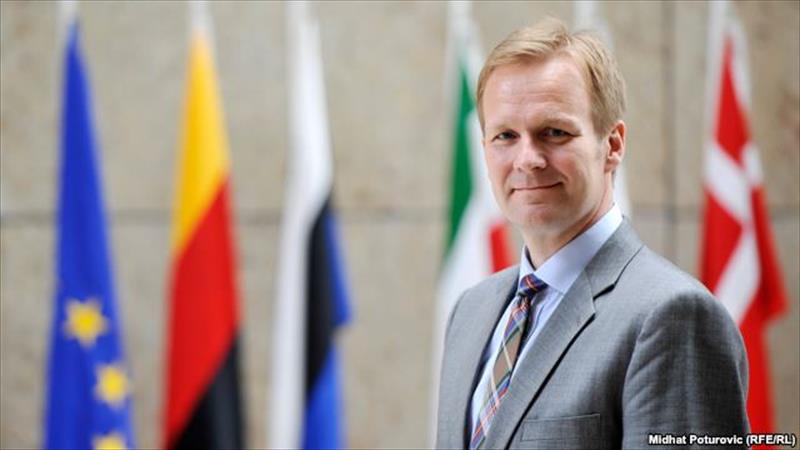Bosnia-Herzegovina belongs to the European Union and has no alternatives on that path. Referring to any scenarios developing elsewhere in the world is nothing else but making noise, because BiH’s territorial integrity is something that cannot be touched. This is the message the Head of the EU Delegation to BiH, Peter Sorensen sends in his interview for the RFE.
Given the latest developments in Ukraine and the fact that as of lately some politicians in Bosnia-Herzegovina, in particular from Republika Srpska, have been referring to the scenario similar to the Crimean one, how important is it to pace up the integration of our country into the NATO and EU?
It is enough just to look at the map to see where BiH is situated. It is situated at the heart of Europe and surrounded either by the member states or those that are already in the negotiations procedure. If we glance back, we’ll see that back in 2003 the European Union made it clear that BiH was located in an up-and-coming area and should become an EU member state. Bosnia-Herzegovina cannot be compared to any country and should not. As far as we are concerned, the question is when and not whether BiH will join the EU and this is something that will bring about benefits for all of us.
How detrimental is such rhetoric for Bosnia-Herzegovina and its political situation?
It’s a waste of time and space and we call it all noise and no substance. This fills the media news, opens discussions but will lead nowhere nor will push the country forward.
A new EU approach has been announced in order to involve Bosnia-Herzegovina in EU integration at a faster pace. On one hand, it is seen as an amnesty of all BiH politicians from their inaction, on the other hand, even an amnesty of the European Union for failing to exert pressure over them even before to make them start working.
You should listen to what will be said between the member states on Monday. You’ll see that a clear line of our policy will continue, primarily that the territorial integrity of the country should not be touched. It is a clear perspective. Also that you should note expect less but more work, as well as that you have to respond to socio-economic issues that have been discussed at large in this period. We do know you have the elections, but, we are sorry, you have to continue working in parallel to that, because the reason for inaction cannot be the fact that you have elections every other year.
We have witnessed a serious diplomatic offensive of distinguished EU officials. How fruitful was it, that is, to which extent have such messages that come from very important places, in your opinion, impact on BiH politicians?
I think that we have managed to explain what we want quite successfully. We want responsible people, an efficient political system, political elites and parties that will work more, not less. I think that the message reached out. BiH is welcome, although there were some dilemmas before, but I think everyone is clear about our current position. Even if there are structures that fail to grasp it, then it is them who wish to turn a deaf ear.
But for that you need partners from the other side, from Bosnia-Herzegovina. You yourselves have witnessed several discussions about the Sejdić-Finci ruling and many other things that stall BiH on its journey to the European Union. What is your impression, why haven’t we seen specific action, i. e. reaction to what the European Union has persistently been offering to Bosnia-Herzegovina?
You are right, in order to succeed, we need partners, and the key is the people here who wish to see it happen. Whether there are political parties, elites, partners who would do that is a good question. We have heard very good statements from their headquarters, but much less action than we expected. What we want to see in order for BiH to catch up with the countries of the region is that statements turn into action. When we say parties, I refer to the institutions, because it is all the same to us. It seems here that there is a delineation of some sort – you either work with political parties or institutions. I’m sorry, but it can’t go on like that. Although we have worked on the Sejdić-Finci case with the leaders of political parties, we have also worked with the institutions. For that reason, they cannot hide behind out not having worked with them because it is people from the political parties that sit in those institutions. The problem is that you have the institutions and legislation that are not capable of catching up with the speed the European Union needs and that is the major challenge.
This is a year of elections and that means a lot of inaction as well – everything will be done to do nothing. If we continue working at this pace, we will have done nothing by the end of the year. Given the pace at which we form governments – it might take quite some time.
To be fair, the system is complicated indeed and decision-making takes some time, but we have heard in our countries as well the same excuses that something cannot be done because of the elections. But, when it comes to EU integration, it goes beyond partisan interests because it is for the good of the country and all who live in it. So, everything that is being done in that area must not be related to the year of elections. Your campaign takes six months, which means you have 18 months to work. Last time, it took 15 months to form the government, which left only three months to work. It cannot go on like that and we shall not accept it.




